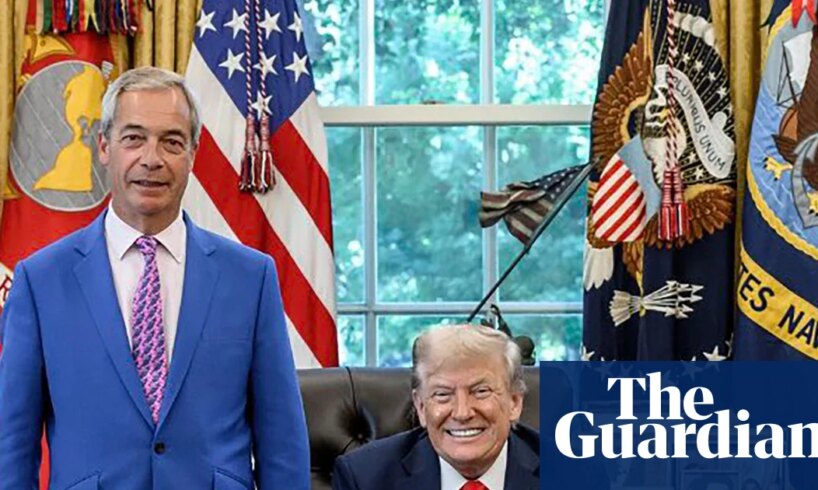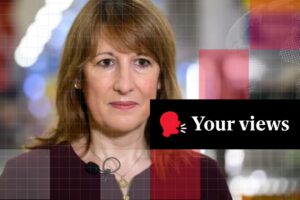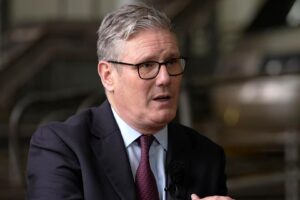
Not long ago, it would have been hard to believe a group of executives from a relatively small overseas broadcaster would be granted a meeting at the White House, let alone an audience with the president of the United States.
Yet when a delegation from GB News – led by Nigel Farage – headed to Washington DC earlier last month to meet Donald Trump’s team, it only confirmed that the Reform UK leader’s Maga connections provided the channel with significant access.
Sir Paul Marshall, the media mogul whose fortune supports the channel, was in the travelling party. Farage and fellow GB News host Bev Turner, were among those to meet the president in the Oval Office. The White House visit sought Trump’s support for GB News’s stateside launch – its new nightly programme, The Late Show Live.
White House backing was on full display at the show’s launch party that evening. Among the guests was Trump’s combative press secretary, Karoline Leavitt. She told the event that GB News shared “the values this administration holds dear: Free speech, that men cannot be women, secure borders – we don’t want illegal aliens invading our countries”.
She said GB News had already been granted access to the White House press briefing room. Turner and Ben Leo, the two hosts of the US show, have briefing room passes. Leavitt said it was part of an effort to hand newer media access, amid Trump’s disdain for more established outlets seen as “woke”.
Also present at the launch party was US secretary of commerce, Howard Lutnick, who urged GB News to “control that narrative” in the UK. Farage told guests its coverage would “change perceptions of who Donald Trump is” in the UK and Europe.
Alan McCormick, the GB News chairman, went further. “Britain has been infected by a mind virus that sees no value in place, in family, in community, in love of country and these views have [been] reinforced by an establishment media who have suppressed any alternative viewpoints,” he said. “GB News was launched to end this neglect.”
For Trump, the embrace of GB News is not just a favour for an old ally in Farage, but another chance to elevate friendly outlets outside the US. For GB News, a close relationship with Trump’s network could help it make a splash.
However, some believe its US arrival also creates another avenue through which talking points from the Trumpian, US right will reach a British audience. The recent “unite the kingdom” protest, organised by far-right activist Tommy Robinson, featured some in the crowd wearing Make England Great Again hats, or T-shirts referencing Charlie Kirk.
“GB News isn’t going to affect the culture of American politics, but does it affect their legitimacy and status in shifting the culture of British politics and society? I think it could,” said Sunder Katwala, director of British Future thinktank.
“The status of GB News is no doubt boosted by this level of access. From the American perspective, they really want a sort of Trumpism International. They want to help GB news break things up.”
Trump has already reposted a GB News clip on Truth Social, his social media platform, while the channel has launched on Truth+, its associated streaming service.
Some senior Maga figures have already appeared on the new show. The first episode featured Kari Lake, a fierce Trump ally. Invited to criticise Keir Starmer’s immigration policies, she said: “England will cease to be England … many people have said it is already gone.” She said if she had a vote, she would vote for Farage.
Asked whether the BBC was “failing the people of Britain”, she replied: “The BBC should not be putting out lies,” she said. “They don’t want to cover anything that makes [Trump] look good.”
Other conversations have flirted with more radical opinions. In an exchange with Seb Gorka, Trump’s controversial senior director for counterterrorism, Turner said of delegates at the UN general assembly: “There will be a lot of people in that room today who are very keen on the idea of a sort of global governance, without the individual nation states.”
GB News’s US launch comes with the broadcaster now challenging other UK news channels, though all have small audiences.
Its average daily viewership – the average number of people watching it at any given point – was 77,200 in the first half of September, according to figures from the Digital-i agency. That put it just ahead of the BBC News channel’s 76,700 and Sky News’s 66,500 average daily viewership.
However, GB News reaches a narrower audience. The number of different households that tune in at any point of the day is about a million. The BBC News channel and Sky News both reach a wider audience – 1.8m and 1.6m respectively.
It points to GB News having a small but dedicated following. It is still not financially self-sufficient, losing £33.4m last year, though its revenues have more than doubled.
The BBC’s main television bulletins still dominate overall – the Six O’Clock News pulls in 3.3m viewers. In the same time slot, GB News averages 109,000 viewers.
Its US expansion has once again raised the question of whether, in allowing GB News to operate with Reform UK presenters and other hosts pushing rightwing opinions, regulator Ofcom has allowed a shift in British broadcasting without any legal change to impartiality rules.
Chris Banatvala, who was Ofcom’s founding director of standards responsible for drafting and enforcing its first broadcasting code, said GB News’s presence had “changed the media landscape”.
“There is a chipping away at the importance and regulation of impartiality,” said Banatvala, who is also an independent member of the Sky News board. “Ofcom appears to be unwilling to intervene and unwilling to regulate this channel in the same way as it regulates other television news channels.”
He said Ofcom had become too focused on “small, technical breaches”, rather than whether coverage represented impartial treatment of controversial topics.
“I don’t think the code or the regulator, or anybody, envisaged the leader of the political party with the highest poll rating having his own personal show on a news channel,” he said. “When you look at it like that, it’s extraordinary.”
The channel’s US drive has also coincided with signs of renewed political interest in its approach. Culture secretary, Lisa Nandy, said recently she was concerned about “polemic presented as fact and opinion presented as news” though did not name GB News specifically.
It remains unclear if Nandy plans any serious reforms to broadcasting rules. Both Ofcom and GB News deny it is regulated differently to other broadcasters. An Ofcom spokesperson said its rules “apply equally to all broadcasters. We enforce these rules fairly and proportionately, acting independently and impartially at all times.
“Our due impartiality rules are robust, while also taking account of the rights of broadcasters and audiences to freedom of expression,” they said. “This means broadcasters have editorial freedom to decide who presents their programmes and to include controversial opinions and debate on topical issues, providing they comply with the broadcasting code.
“A broadcaster’s approach can vary according to the nature of the subject, the type of programme and channel, and the likely expectation of the audience.”
After Nandy’s recent intervention, Angelos Frangopoulos, the GB News chief executive, said she was “either mistaken or misinformed about the nature of GB News programming”. He said it was “entirely wrong” to suggest it observes different standards to other broadcasters.
A GB News spokesman pointed to its editorial charter, which states it “refuses to bow to convention or be swayed by those who shout loudest. We are here for everyone, not the establishment”. It states its journalists “reject propaganda and refuse to be swayed by partisan agendas”.





